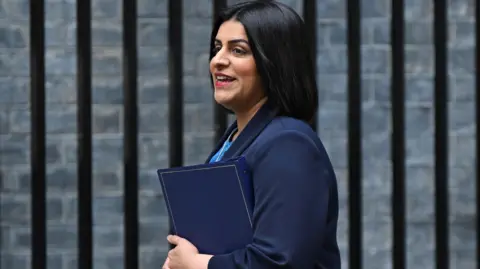In a recent statement that has stirred considerable discussion within the UK and beyond, Justice Secretary Shabana Mahmood expressed that foreign criminals should anticipate deportation, emphasizing the need for clarity in the legal framework surrounding human rights. Speaking at a meeting of foreign ministers at the Council of Europe in Strasbourg, Mahmood articulated that existing laws often seem to protect individuals “who break the rules.” Her remarks come amidst ongoing debates about the future of the European Convention on Human Rights (ECHR), highlighting a push from certain factions within the UK government to reassess the scope and application of this foundational legal document.
Mahmood reiterated the UK’s commitment to the ECHR while advocating for necessary adaptations in response to contemporary challenges, indicating that the convention must evolve alongside shifting societal realities. Established in 1950, the ECHR has been central to human rights legislation in the UK and other signatory countries, overseeing vital rights and freedoms. Mahmood’s stance calls attention to the perception that the Convention may be used by criminals to evade accountability. For example, she cited cases where foreign criminals utilized Article 8, which relates to the right to family life, to contest deportation orders.
The sentiment that human rights laws may impede justice for victims of crime is echoed by various Conservative Party members, who have proposed that the UK should potentially withdraw from the ECHR to regain unilateral control over immigration matters. Leading this discourse, Conservative leader Kemi Badenoch has positioned the ECHR as a “sword” that undermines democratic decisions, particularly regarding actions to expel illegal migrants and foreign offenders. As part of her stance, she has initiated a commission tasked with examining the implications of leaving the treaty, reflecting the division within the party over this contentious issue.
Critically, Mahmood’s assertions that human rights law should not unduly benefit foreign criminals are part of a broader governmental narrative advocating for legislative changes. Plans are underway to revise how Article 8 intersects with immigration laws to bolster Parliament’s control over the UK’s borders. This approach is poised to resonate with constituents who feel that the current legal framework favors offenders over law-abiding citizens.
Despite these divisions, Mahmood emphasized the importance of open dialogue regarding the future of the ECHR. She noted that the Convention was not intended to be static, highlighting the need for ongoing evolution in response to new threats and realities. The UK, she explained, is currently engaged in reviewing its domestic implementation of the ECHR, an effort that represents an active pursuit of legal reforms.
Reinforcing Mahmood’s perspective, several countries within the Council of Europe have echoed calls for reforming the ECHR, motivated by assertions that it has increasingly favored the “wrong people.” An open letter signed by nine nations, including Italy and Denmark, brought these concerns to light earlier this year. Even the head of the Council of Europe, Alain Berset, acknowledged the necessity for the Convention to adapt to current challenges, thus underscoring a broader consensus on the need for its re-evaluation.
Contrastingly, the Liberal Democrats have voiced strong objections to the idea of the UK departing from the ECHR, with their leader, Sir Ed Davey, arguing that such a move would align Britain with authoritarian regimes. He advocates for constructive discussions amongst member states to foster beneficial changes rather than turning away from the convention entirely, suggesting that its current framework serves the citizens of the UK well.
In summary, the UK government’s overture toward re-examining its relationship with the ECHR signifies a pivotal moment in national legislative discourse. As debates regarding immigration laws, human rights, and judicial reforms continue to evolve, the implications of these discussions will likely shape the UK’s human rights landscape for years to come. The conversation is critical not only for policymakers but also for citizens concerned about the balance between upholding rights and ensuring justice.



